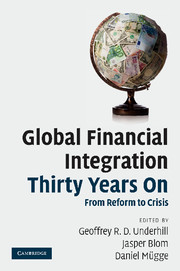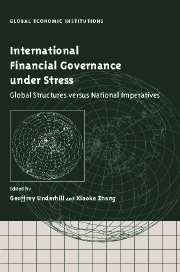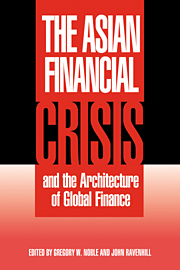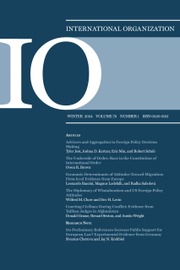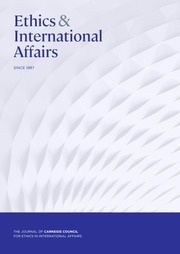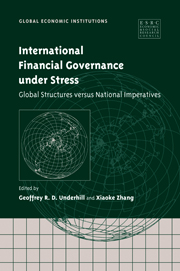Global Financial Integration Thirty Years On
From Reform to Crisis
$37.99 ( ) USD
- Editors:
- Geoffrey R. D. Underhill, Universiteit van Amsterdam
- Jasper Blom, Universiteit van Amsterdam
- Daniel Mügge, Universiteit van Amsterdam
- Date Published: September 2010
- availability: This ISBN is for an eBook version which is distributed on our behalf by a third party.
- format: Adobe eBook Reader
- isbn: 9780511910838
Find out more about Cambridge eBooks
$
37.99 USD
( )
Adobe eBook Reader
Other available formats:
Hardback, Paperback
Looking for an examination copy?
If you are interested in the title for your course we can consider offering an examination copy. To register your interest please contact collegesales@cambridge.org providing details of the course you are teaching.
-
Early in the new millennium it appeared that a long period of financial crisis had come to an end, but the world now faces renewed and greater turmoil. This volume analyses the past three decades of global financial integration and governance and the recent collapse into crisis, offering a coherent and policy-relevant overview. State-of-the-art research from an interdisciplinary group of scholars illuminates the economic, political and social issues at the heart of devising an effective and legitimate financial system for the future. The chapters offer debate around a series of core themes which probe the ties between public and private actors and the consequences for outcomes for both developed markets and developing countries alike. The contributors argue that developing effective, legitimate financial governance requires enhancing public versus private authority through broader stakeholder representation, ensuring more acceptable policy outcomes.
Read more- Issues addressed include regulation and supervision to aid architecture; illicit finance to debt workout; the 'new' financial architecture and its failure; the causes of the crisis; and what to do about it and how
- The analysis and implications/policy recommendations are based on a highly credible presentation of data-based and new research findings
- Will appeal to practitioners puzzling over the future of reform, to those seeking an analytical basis for the solutions they seek, and to scholars and students seeking new sources of understanding in relation to the bewildering world of global finance and its governance
Reviews & endorsements
“Amidst the flurry of commentary provoked by the global financial crisis, this impressive collection of essays stands out for both the breadth of its coverage and the depth of its analysis. The editors have brought together an outstanding group of scholars to address the challenge of financial governance today, with the linked issues of effectiveness and legitimacy taking center stage. The book is a must read.”
Benjamin J. Cohen, Louis G. Lancaster Professor of International Political Economy, University of California, Santa BarbaraSee more reviews“Written in the midst of an emergency that nearly brought down the global economy, the chapters in this timely and cohesive book range widely over a vital arena where the legitimacy and effectiveness of key policies are now highly debatable. The editors gathered many of the world’s best analysts to set out and critically examine the post-crisis reform agenda. The result will reward the careful attention of scholars, students, and practitioners alike.”
Louis W. Pauly, Canada Research Chair in Globalization and Governance and Director of the Centre for International Studies, University of Toronto; Editor, International Organization“The global financial crisis has demonstrated the weaknesses of international financial governance. The emergence of the G20 is one response, but just a promising beginning. This book offers a wide range of timely lessons from history, political economy and finance to guide us in exploring new paths to a safer international financial system. It is a fine example of how research can inform policy.”
Richard Portes, Professor of Economics, London Business SchoolCustomer reviews
Not yet reviewed
Be the first to review
Review was not posted due to profanity
×Product details
- Date Published: September 2010
- format: Adobe eBook Reader
- isbn: 9780511910838
- availability: This ISBN is for an eBook version which is distributed on our behalf by a third party.
Table of Contents
Introduction: the challenges and prospects of global financial integration Geoffrey R. D. Underhill, Jasper Blom and Daniel Mügge
Part I. History and Context: Input, Output and the Current Architecture (Whence it Came):
1. Financial governance in historical perspective: lessons from the 1920s Randall Germain
2. Between the storms: patterns in global financial governance 2001–7 Eric Helleiner and Stefano Pagliari
3. Deliberative international financial governance and apex policy forums: where we are and where we should be headed Andrew Baker
4. Finance, globalisation and economic development: the role of institutions Danny Cassimon, Panicos Demetriades and Björn Van Campenhout
Part II. Assessing the Current Financial Architecture (How Well Does it Work?):
5. Adopting international financial standards in Asia: convergence or divergence in the global political economy Andrew Walter
6. The political economy of Basel II in the international financial architecture Stijn Claessens and Geoffrey R. D. Underhill
7. The catalytic approach to debt workout in practice: coordination failure between the IMF, the Paris Club and official creditors Eelke de Jong and Koen van der Veer
8. Empirical evidence on the new international aid architecture Stijn Claessens, Danny Cassimon and Björn van Campenhout
9. Who governs and why? The making of a global anti-money laundering regime Eleni Tsingou
10. Brazil and Argentina in the global financial system: contrasting approaches to development and foreign debt Victor Klagsbrunn
11. Global markets, national alliances and financial transformations in East Asia Xiaoke Zhang
Part III. What Does the Future Hold? Reactions to the Current Regime and Prospects for Progress (Where is it Going?):
12. Changing transatlantic financial regulatory relations at the turn of the millennium Elliot Posner
13. Monetary and financial co-operation in Asia: improving legitimacy and effectiveness? Heribert Dieter
14. From microcredit to microfinance to inclusive finance: a response to global financial openness Brigitte Young
15. Combating pro-cyclicality in the international financial architecture: towards development-friendly financial governance José Ocampo and Stephany Griffith-Jones
16. Public interest, national diversity and global financial governance Geoffrey R. D. Underhill and Xiaoke Zhang
Conclusion: whither global financial governance after the crisis? Daniel Mügge, Jasper Blom and Geoffrey R. D. Underhill.
Sorry, this resource is locked
Please register or sign in to request access. If you are having problems accessing these resources please email lecturers@cambridge.org
Register Sign in» Proceed
You are now leaving the Cambridge University Press website. Your eBook purchase and download will be completed by our partner www.ebooks.com. Please see the permission section of the www.ebooks.com catalogue page for details of the print & copy limits on our eBooks.
Continue ×Are you sure you want to delete your account?
This cannot be undone.
Thank you for your feedback which will help us improve our service.
If you requested a response, we will make sure to get back to you shortly.
×
